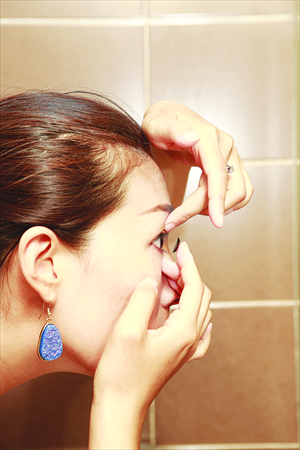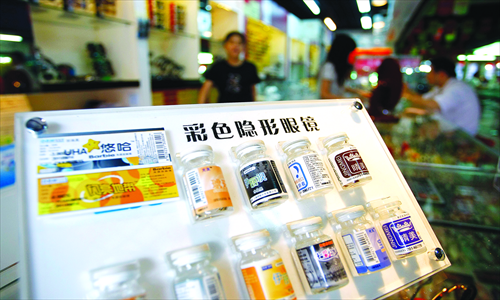Sight for sore eyes

Colored contact lenses are popular among many young people, although ophthalmologists warn they can cause cornea damage. Photo: Li Hao/GT
Every time Raymond Spence visits China, he always packs as many boxes of contact lenses as he can afford for his trip home to Britain.
"It is more convenient and cheaper [buying contact lenses in China] than the UK," said the 21-year-old, who recently graduated from the University of Leeds. "Buying contact lenses in China is quite easy as a prescription isn't required, whereas in the UK you need a prescription unless you purchase contact lenses online."
But the last time Spence bought contact lenses in Beijing he noticed a price hike. Now, he worries that it won't be long before they cost the same price as in the UK.
When Zhang Huimin went to Australia for her postgraduate studies three years ago, she also stocked up contact lenses before leaving China so that she had enough to last 18 months.
Disposing myths
Zhang, 24, used to wear SofLens 59, a type of monthly disposable contact lenses sold in China made by Bausch & Lomb, one of the biggest international contact lens manufacturers. In Australia, she found the same product with the same name, but instead of being labeled as "monthly" it was "fortnightly."
Zhang sought advice from her ophthalmologist, who said some of the same brands of contact lenses can be sold with different recommended durations in different countries. "That means sometimes the domestic quality standards are not as strict as international ones," said Zhang, who has since began exclusively buying contact lenses in Australia.
According to the American Optometric Association, contact lenses are classified based on their replacement schedule. There are daily-wear lenses, which should be replaced daily, and lenses replaced on a planned schedule, most either fortnightly, monthly or quarterly.
Generally speaking, the more frequently you dispose of your contact lenses, the better, said Steven Zhang, an ophthalmologist who works at Parkway Health, a private healthcare services provider in Asia.
"With overall consideration of oxygen permeability and prices, daily disposable contact lenses are the most comfortable even if monthly ones offer the best value for money," he said. "Daily disposable contact lenses aren't as common [in China] as in the West mainly because of the price difference."
A manager at the Letong spectacles store in Chongqing, who only gave her surname as Chen, told Metropolitan that domestic consumers are still holding on to the old concept that one-year contact lenses are better.
Questionable quality
Spence, who wears contact lenses daily, claims the only difference between the contact lenses he buys in China and those in the UK is the price. He always buys trusted brands and has never tried any Chinese brands. "I don't recognize [Chinese brands] and don't know if they are the correct type of lenses I'm looking for," he said.
Spence has never used colored contact lenses, yet in Beijing he notices people wearing them on regular nights out and not as part of a costume theme.
Colored contact lenses are popular among many young Chinese because they change the color of the cornea and can make, in their belief, their eyes more attractive.
Spence has heard rumors that colored lenses produced in China are cheap, tear easily and can get trapped in the eye. Ophthalmologist Zhang supports this theory, saying some cheap varieties can even "lose their color in the eye."
Zhou Yuehua, an ophthalmologist who works at Beijing Tongren Hospital, said that about 80 percent of oxygen the cornea needs comes from the air, meaning oxygen permeability is an important consideration when buying contact lenses. Zhou advises against colored contact lenses because their permeability is usually poor.
Chen points out that colored contact lenses are more notorious because their users include people with good eyesight, who might not be familiar with wearing contacts and proper eye hygiene.
But low prices don't guarantee good quality when it comes to contact lenses. A search for "colored contact lenses" on 1688.com, a Chinese wholesale retail website, yields more than 3,000 kinds on sale at low prices. Many are advertised as made in South Korea or Japan. One of the cheapest is South Korean brand Barbie-Eye's Lace Princess line, priced at 8 yuan ($1.20) per pair and advertised with a duration use of one year.
In January 2011, the Global Times reported many shops selling colored contact lenses do not have a permit to do so. Liu Duoning, secretary general of the Beijing Optometric and Optical Association, said at the time that optometrist should test customers' eyes and issue a prescription before selling contact lenses, but not all retailers obey these guidelines.
Yan Yuxin, 19, a sophomore college student who has been wearing colored contact lenses for four years, recently opened a small business as a purchasing agent. She buys colored contact lenses made in Japan and sold based on customer orders.
Most Chinese brands of contact lenses cost a few hundred yuan at most, while Japanese brands can cost up to thousands of yuan per order, according to Yan. But higher prices don't turn all people away from Japanese brands, Yan said, noting some customer feedback reflects greater confidence in contact lenses made in Japan,
Yan, who notes that the domestic market is flooded with cheap colored and decorative contact lenses, tried one cheap domestic product once and said it caused her eyes to feel dry.
"But quality domestic products are as comfortable as imported ones," she added.


Some brands of contact lenses sold in China are advertised as having longer duration uses than those sold overseas. Photos: IC
Watching out for safety
Last year, Shanghai police seized more than 1.8 million counterfeit contact lenses valued at about 61 million yuan, the Global Times reported on September 18, 2012.
The people who gain the biggest profits from the sale of counterfeit contact lenses are manufacturers and wholesalers, said Chen, adding that the threshold of dispensing and selling contact lenses is too low in China.
China's Food and Drug Administration categorizes contact lenses as a medical device that require strict management and supervision. The administration also states that decorative colored contact lenses must be manufactured and supervised under the same standards and regulations as vision-correcting contact lenses. On its website, people can look up the supervision serial number printed on the box of a particular imported product to assess if it is legitimate.
The Beijing Drug Administration warns consumers on its website to watch out for illegal sellers of contact lenses online. People should only purchase contact lenses and other optical products from qualified retailers with a business entity license, a business license for medical device, a qualification certificate of online drug information and an Internet content provider license.
Under Chinese law, online sellers of contact lenses are required to show their qualification certificate for online drug information services or drug transaction services on their home page. If people cannot find relevant certification or serial numbers, they are advised not to buy contact lenses from the online vendor.
Ophthalmologist Zhang told Metropolitan that he often treats patients for conditions caused by poor quality contact lenses. The most common problems include dry, red and itchy eyes, and even ceratitis and corneal abrasion, which can lead to loss of eyesight.
Zhou advises contact lens users to wear them sparingly and book an appointment with an optometrist before buying them for the first time. He also advises people to wear contact lenses for fewer than eight hours each day.
Contact lenses are not for everyone, Zhang said. They are not suitable for children under 18 and women who are breast-feeding, pregnant, in menopause or experiencing their menstrual period because their hormone levels are unstable.